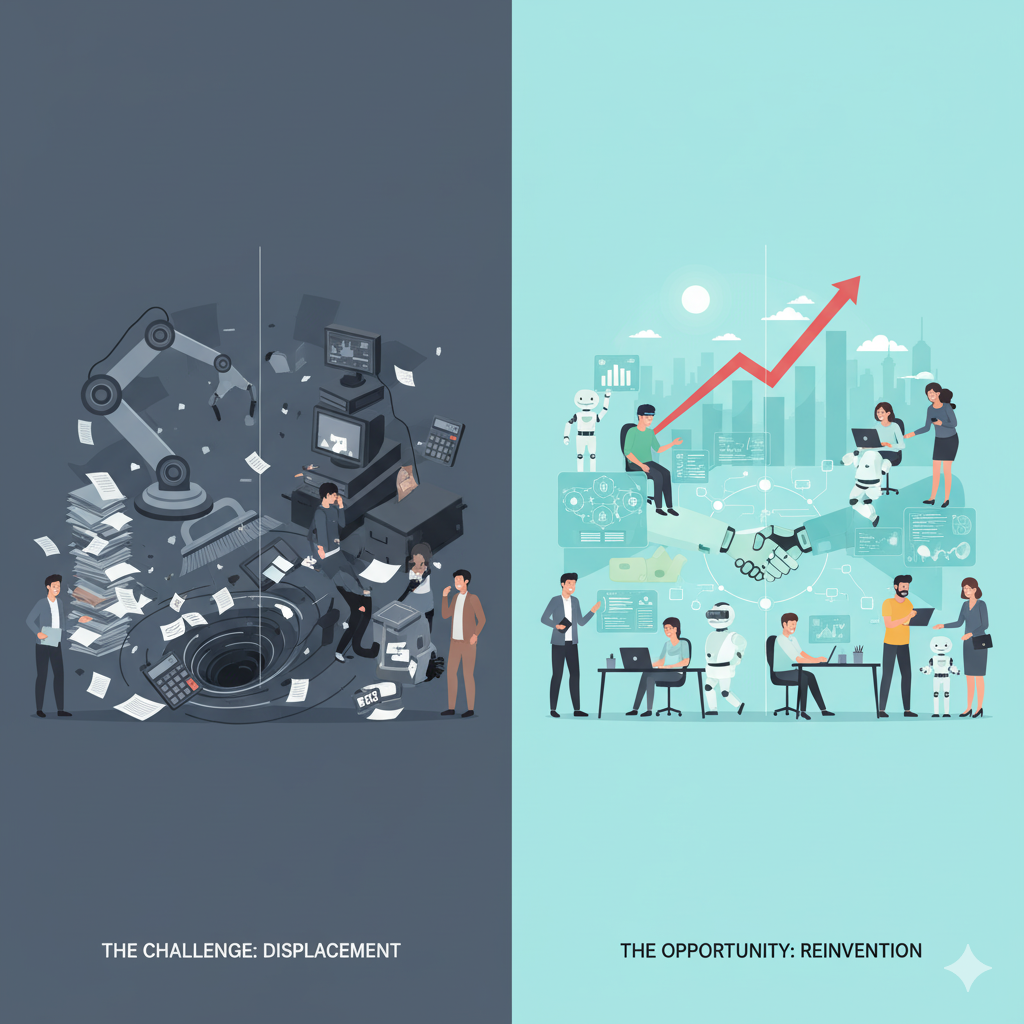In the rapidly evolving landscape of the 21st century, artificial intelligence (AI) stands as a transformative force, reshaping industries, redefining job roles, and demanding a proactive approach to career development. Understanding AI’s multifaceted impact and strategically preparing for its integration is paramount for sustained career success.
The Profound Impact of AI on the Job Market
AI’s influence on employment is not monolithic; it presents a complex interplay of challenges and opportunities:
- Automation of Routine and Repetitive Tasks: The most immediate and noticeable impact of AI is its ability to automate tasks that are repetitive, predictable, and rule-based. This includes a wide array of activities such as data entry, clerical functions, basic customer service interactions (often handled by chatbots and virtual assistants), inventory management, and payroll processing. AI systems excel in performing these tasks with speed and accuracy, significantly reducing the incidence of human errors and freeing human workers to focus on more complex, creative, and interpersonal aspects of their roles. While this can lead to job displacement in specific sectors, it also creates an imperative for workers to upskill and transition into roles that leverage distinctly human attributes.
- Augmentation of Human Capabilities and Enhanced Decision-Making: Far from simply replacing human labor, AI frequently augments human capabilities, providing powerful tools that enhance decision-making across various industries. In finance, AI algorithms perform sophisticated risk assessments, analyze market trends, and streamline loan approvals, empowering financial professionals with deeper insights. In healthcare, AI assists in diagnostic imaging by identifying subtle patterns that human eyes might miss, aids in patient monitoring through continuous data analysis, and even helps in personalized treatment planning. In marketing, AI drives targeted advertising campaigns, analyzes customer behavior for segmentation, and optimizes pricing strategies, leading to more effective and personalized customer engagement. This collaborative dynamic allows humans to make more informed and strategic decisions, leveraging AI for data processing and analysis.
- Creation of New Job Categories and Specialized Roles: While some traditional jobs may diminish, AI is simultaneously a powerful engine for the creation of entirely new job categories and specialized roles. This necessitates a forward-looking perspective on career development. Examples include:
- AI Trainers: Specialists who teach AI systems how to interpret data accurately, refine their learning processes, and ensure their outputs are aligned with human understanding and ethical guidelines.
- Data Analysts and Scientists: Professionals adept at interpreting large datasets to extract actionable insights, build predictive models, and guide strategic business decisions.
- AI Ethicists and Governance Specialists: Experts who ensure AI implementations adhere to ethical standards, address biases, ensure fairness, and comply with regulatory frameworks.
- Machine Learning Engineers and Developers: Specialists in designing, building, and deploying machine learning algorithms and AI systems.
- Robotics Engineers: Professionals who design, build, and maintain robotic systems that often incorporate advanced AI capabilities.
Industries Undergoing Transformative Change Driven by AI
Several industries are experiencing profound and often rapid disruption due to the integration of AI, necessitating a re-evaluation of traditional practices and skill sets:
- Healthcare: AI is revolutionizing healthcare delivery. AI-driven diagnostic tools, such as IBM Watson Health, assist clinicians in analyzing vast amounts of medical data to identify diseases more accurately and earlier. Robotic surgical systems, like the da Vinci Surgical System, enhance precision and reduce invasiveness in complex procedures. Predictive analytics for patient monitoring can anticipate health crises, leading to proactive interventions and dramatically improving patient outcomes and operational efficiency across hospitals and clinics.
- Finance: The financial sector is being fundamentally reshaped by AI. Automated trading systems, extensively used by major hedge funds, execute trades at lightning speed based on complex algorithms. AI-driven fraud detection software used by banks can identify and prevent fraudulent transactions in real-time, safeguarding assets. Algorithmic investing platforms like Betterment and Wealthfront provide personalized financial advice and portfolio management, democratizing access to sophisticated investment strategies.
- Manufacturing and Industrial Automation: AI-powered robotics systems and highly automated machinery in advanced factories, such as Tesla’s Gigafactory, have ushered in an era of unprecedented efficiency, precision, and safety. AI optimizes production lines, predicts equipment failures, and ensures quality control, significantly reducing operational costs and enabling mass customization.
- Technology and Software Development: The very industry that birthed AI is also being transformed by it. AI tools like GitHub Copilot assist developers with coding, suggesting code snippets, and debugging tasks, accelerating development cycles. Conversational AI models like ChatGPT aid in various aspects, from generating technical documentation and assisting with project management to providing sophisticated customer support interactions.
Essential Skills for an AI-Powered Future Workforce
To remain competitive and thrive in an increasingly AI-augmented world, individuals must proactively cultivate a blend of foundational, critical, emotional, and technical skills:
- Digital Literacy and AI Fluency: Beyond basic computer skills, this entails a foundational understanding of how AI tools function, familiarity with various digital collaboration platforms, and an awareness of cloud computing services like AWS, Azure, and Google Cloud, which underpin many AI applications. It’s about understanding AI’s capabilities and limitations, not necessarily being an AI developer.
- Critical Thinking, Complex Problem-Solving, and Creativity: While AI excels at data processing and pattern recognition, uniquely human attributes remain indispensable. Critical thinking allows for nuanced interpretation of AI-generated insights, questioning assumptions, and identifying potential biases. Creative problem-solving is vital for navigating ambiguous situations and developing innovative solutions that AI cannot yet formulate independently. Ethical judgment is crucial for responsible AI deployment and ensuring its alignment with societal values.
- Emotional Intelligence and Interpersonal Skills: As AI automates routine tasks, human-centric roles emphasizing empathy, effective communication, and interpersonal dynamics become more prominent. Skills such as relationship-building, conflict resolution, active listening, and teamwork abilities are areas where AI is inherently less effective. These “soft skills” are critical for leadership, client management, and fostering collaborative environments.
- Technical Expertise and Data Proficiency: For those looking to directly engage with AI technologies, acquiring specific technical skills is highly advantageous. This includes proficiency in data analysis using tools like SQL and programming languages like Python (which is widely used for data science and AI). Understanding machine learning frameworks such as TensorFlow and PyTorch, and having a strong grasp of programming languages like JavaScript and Java, will position individuals well for emerging job roles in AI development, data engineering, and machine learning operations.
Proactive Strategies for AI Integration and Career Preparedness
Taking proactive steps is essential to smooth your transition into an AI-augmented workplace and leverage its opportunities:
- Embrace Lifelong Learning and Continuous Upskilling: The pace of technological change necessitates a commitment to continuous learning. Regularly updating your skills through online courses on platforms such as Coursera, Udacity, and edX is crucial. Pursuing certifications in AI, data science, cloud computing, and specialized AI applications can significantly enhance your employability and demonstrate a commitment to staying current.
- Stay Informed and Engaged with Industry Trends: Cultivate a habit of following industry trends, subscribing to reputable tech news outlets like TechCrunch, Wired, MIT Technology Review, and Forbes AI. Participating in AI-focused professional networks, forums, and conferences can provide invaluable insights into emerging technologies, best practices, and future job market demands.
- Cultivate Adaptability, Resilience, and a Growth Mindset: The AI revolution means that job roles and responsibilities will continue to evolve rapidly. Cultivating flexibility, resilience in the face of change, and an openness to learning new approaches are paramount. Embracing a growth mindset—believing that abilities can be developed through dedication and hard work—is key to navigating these shifts successfully.
The Future is Collaborative: Human-AI Synergy
The narrative around AI should not be one of human displacement but rather one of human-AI collaboration. AI doesn’t necessarily signify the end of human jobs; instead, it signals a profound shift towards symbiotic work arrangements where humans and AI complement each other’s strengths. By understanding these fundamental shifts, actively preparing yourself with relevant skills, and embracing a mindset of continuous adaptation, you can harness the transformative power of AI to not only safeguard but significantly enhance your career prospects.
Preparing today means thriving tomorrow in an AI-driven world, where innovation and human ingenuity, amplified by intelligent machines, will shape the future of work and society.


Leave a Reply